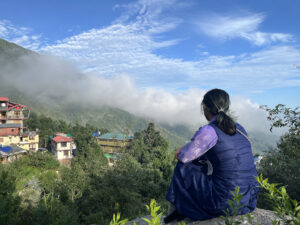 We are sitting side-by-side in a local café in McLeod Ganj, holding identical copies of Thich Nhat Hanh’s book How to See, reading along together.
We are sitting side-by-side in a local café in McLeod Ganj, holding identical copies of Thich Nhat Hanh’s book How to See, reading along together.
Water Reflecting
The clear still water of a mountain lake reflects the mountain and the sky with pristine clarity. You can do the same. If you are calm and still enough, you can reflect the mountain, the blue sky, and the moon exactly as they are. You reflect whatever you see just as it is, without distorting anything.
We review a few unfamiliar words, but mostly sit together contemplating the deeper message, admiring an illustration on the opposite page.
I reflect on our discussion earlier that week, during which she, my friend who will remain unnamed, told me her story about coming to India from Tibet in 2018. The year alone makes her story especially significant: before 2008 some 3,000 refugees arrived in India annually, which dwindled to less than 100 (some estimate much less) in the past decade.
As we read How to See, I consider the resonance between Thich Nhat Hanh’s message and my friend’s profound experiences.
Upon arrival in Kathmandu, after a frightening journey on many modes of transportation from Tibet, my friend recalls meeting another Tibetan woman at the reception centre. The woman had been badly injured on the journey – neglected by her guides who got intoxicated and lost their way – and was in the midst of a slow, painful recovery. What struck my friend most about this encounter was the woman’s positive outlook on life, inspired to heal so she could eventually meet His Holiness the Dalai Lama.
“She was in so much pain but she wasn’t sad,” my friend tells me, which led her to a realisation: “It all depends on our mind; if in our mind we don’t feel it’s so difficult, then it’s not so difficult.”
This kind of resilient attitude reminds me of Sarah Lewis’ research on the protective qualities of sems pa chen po (spacious mind), inspiring the title of her 2019 book Spacious Minds: Trauma and Resilience in Tibetan Buddhism. It echoed the strength of my friend, whose journey dates back to childhood.
From the time she was in middle school in Tibet, my friend dreamt of living abroad. She began learning English but lost motivation to continue when she couldn’t get a passport or plan travel. She continued facing challenges finding a job, even with Chinese fluency.
“I would send a resume and get an interview,” she recalls. “But when they saw me and knew I was Tibetan, even though they needed someone to work, they would say they didn’t.”
She continued to face anti-Tibetan discrimination as a jobseeker in mainland China, where even hotels would reject her as a guest. While she could work in her remote hometown, her strong desire to “live outside” endured. “Finally, I had the feeling: I can’t live here.”
After leaving her hometown in 2012, she lived in a Chinese city with a group of childhood friends. But it wasn’t until 2018 that she had the opportunity, with the support of an international family member, to escape.
The hospitable reception centres in Nepal and India made her transition smooth, for which my friend effusively expresses gratitude. Her arrival in Dharamshala was particularly special as it represented the opportunity to meet His Holiness the Dalai Lama. The day of her visit she joined a small group of 12 exiled Tibetans to meet His Holiness. In anticipation, they couldn’t sleep the night before.
“I can’t explain in words how emotional it was,” she reflects, acknowledging that not all Tibetans have this opportunity. Her motivation to study His Holiness’ teachings led her to spend a year living in a nunnery studying Buddhism. Thinking of the optimistic woman she met in Nepal and so many others who inspired her along the way, she was determined to learn to control her mind.
As she settled, finding work that aligned with her values was important to her. She declined a paid opportunity at a large institution to instead volunteer to teach at a social service organisation, where she is now employed.
“I wanted to do something that wasn’t just for money,” she says. “I wanted to do something for others, even if it was small.”
These days, she is motivated to continue working to benefit the Tibetan community and practice Buddhism.
“Whatever we do, we need to be present with that moment,” she reflects on the teachings. “We can impact people positively just by being present.”




 Print
Print Email
Email













